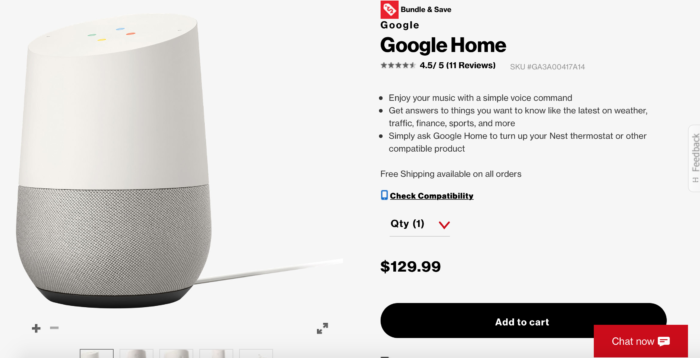You may not have even considered how voice search will affect the success of your brand, but with voice searches becoming more and more popular, it’s time to address just what it will mean for your search rankings.
Digital Brand Visibility: How Voice Search Changes Everything
Intelligent personal assistants are being used for everything these days. From telling you the weather, reading your calendar, playing music, and making a call, voice searches are growing in popularity.

More than half of teens (13-18) use voice search daily—to them it’s as natural as checking social media or taking selfies. Adults are also getting the hang of it, with 41 percent talking to their phones every day and 56 percent admitting it makes them “feel tech savvy.”
Why Voice Search Matters
Voice search matters on several different levels.
When examining it at the search engine level, it creates a faster interaction which will lead to more retention and engagement from your customers. This is only true though if the results of the search are accurate.
On a consumer level, it makes sense simply because it’s faster. Also, the general public has the drive to do less while receiving more.
For businesses, we already know that consumer behavior and search engine investments are linked. Now we can add to it the belief that the search engine has the best answer for our needs. Search engines have already earned our trust in this matter by their establishment of shared systems of structured data. When businesses comply with those best practices, they get to join the circle of trust in the content shown to customers.
The big players that provide the hardware and services for the voice search devices are now fighting for customer loyalty. Google wants to take over and be the best because they already feel like they’re the best at answer all questions, anywhere, anytime. However, Amazon also has a foot in the game and is trying to engage customers to shop through them. The engagement that is already taking place equals billions of dollars in revenue as they fight to be leaders in this space.

How Does Voice Search Impact Business?
The biggest change to affect businesses from voice search is the lack of results. When a search is spoken, the consumer will get one spoken result back.
Voice search is all about the one best answer. So when you search this way you won’t get a list that encourages you to explore and engage. You’ll just get one answer spoken back to you.
This is why the pressure is on to optimize your website and employ all your options to gain search engine’s trust. In an ideal circumstance, you’ve done everything you can and gain trust. So you’ll be the one trusted enough to get your results spoken out loud.
It’s important to remember, however, that reaching this goal is not the end of the road. As with conventional searches, the search engines will continue to be testing to make sure that they are giving their users the best answers for their searches.
Apps
Another layer in voice search technology is apps. When a system provides voice results, there is an app backing them up. The app will show even more results than the original voiced answer. This means that consumers can ask to hear the next result.
What this means for you is that if you don’t meet your goal of becoming number one, it won’t kill you right away. The apps will store information from the searches so that you can still ask and explore your question with immediate answers.

This doesn’t change the fact that there is still immense pressure to get to the top of the search stack. This is why adding an integration in the results that a voice assistant-paired app will show is new territory for businesses to fight for.
With all of this work you’ll be putting in your business, it is important to remember:
Consumers type questions differently than they say them out loud.
This happens because people can speak more words per minute than they can type. People are also less deliberate with the words they speak than they are when they type out a question.
This has caused a rise in conversational search.
SEE ALSO: Optimize all your content for search
Do You Understand Your Customer’s Journey?
To succeed in today’s environment, they must be able to understand their customer’s journey. This is the true test of how well a company has been able to position itself.
The goal is simple: position your brand at locations along your customer’s natural journey where you can provide useful services, information, and products.
You will be able to know right away how well you are aligned because it will affect how search engines rank you. If you’ve proven yourself to be useful to a search engine’s customers, then you will consequently rank well. This will also happen more frequently.
On a similar note, if you aren’t able to provide an ideal solution to your customer’s journey, then the search engines will hold you back in the rankings to see if others can do better in higher positions. This is why it is vital that you understand exactly where you rank in the exact context of what searchers are looking for.
Focus on Context
Voice search by its nature understands a lot of contexts. This is because the systems that are powering voice searches are getting a lot smarter.
Currently, the systems powering voice search can understand context. This means that if you ask them a question about a specific thing, let’s say the Eiffel Tower, and then ask it a follow-up question referring to the Eiffel Tower as ‘it’, your system will know what you’re talking about.
There are a few specific data points that feed into your most used system. These points include your physical location, the time of day, past questions, and what you’re searching for on your mobile device right at that second.
It is your job as a business, to make sure you can understand the context that exists for your consumer and conform yourself to fit their needs. This will be the biggest determinant of your success with voice search.
Voice search is creating a shift in focus from finding the top rankings on keywords to a specific focus on what people want outside of just keywords.

How Can You Keep You Business Competitive?
1. Know Your Digital Knowledge
There is no way for digital assistants to know the facts of your business if you don’t know them yourself.
Make sure that your information is organized and centralized around the public facts about your brand. Having a central source of truth will make it easy to make updates and more importantly, maintain consistency.
It’s important to understand that you can’t rely on technology alone to do this for you. You will also need great people who can source and manage your digital knowledge. This need has created a new position: Digital Knowledge Manager.
This person will be able to reach across the internal groups within your brand and manage all the digital assets your company has to get the best value from every element.
Your Digital Knowledge Manager should be able to identify new trends, technology, and techniques that can catapult your brand into a position of leadership. They should also be able to make sure that your brand information is correct on every device and platform that consumers are using.
2. Manage Your Knowledge
There are certain aspects of your brand that will be in flux. Things like store relocations, seasons, promotions, and weather closures can remind us that our businesses are dynamic, and not a convenient one-and-done project.
This means that you will have to provide richer knowledge about your business. Consequently, it also means that you will have to actively manage your knowledge of the inside of your organization and how it is perceived where your customers are looking.
3. Go Live
When your knowledge is organized, it’s time to get it published. Make sure that it is in all the places where intelligent systems are looking to supply answers to voice searches.
Make sure your information is published on your website, apps, internal systems, and the intelligent services themselves.
Whenever your information changes, be sure to publish it again. This is an active process that isn’t just about consistency. It’s about providing accurate, up-to-date information.
4. Focus on the Conversational Longtail
If your content is hidden or hard to discover, search engines won’t be able to find it. It’s as simple as that.
You need to make sure that your website, videos, and all other content have contextualized your public facts. This will make sure that intelligence services can find and understand it.
It’s also important to make sure that your website is mobile friendly. Phones are still the biggest place where people use voice interactions, even with Google Home and Amazon Alexa.
5. Learn Schema Markup
Using Schema markup will help ensure that your brand has the proper association of content in categories that search engines understand.
Things like Schema markup help an engine grow trust in your website and content, so take advantage of that. Being secure shows an investment in protecting consumers, again an area the engines favor and actively support.
Final Thoughts
Voice search is a big part of our future. Failure to adapt to this fact may mean being left behind by search engines. Taking some time to make sure that your website is ready to be found through voice search will be a great investment for your brand’s future.
Do you use voice search?











